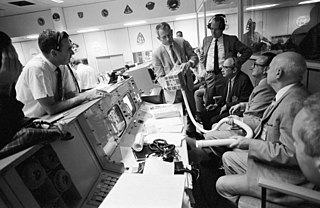
Systems engineering is an interdisciplinary field of engineering and engineering management that focuses on how to design, integrate, and manage complex systems over their life cycles. At its core, systems engineering utilizes systems thinking principles to organize this body of knowledge. The individual outcome of such efforts, an engineered system, can be defined as a combination of components that work in synergy to collectively perform a useful function.

The Institute of Electrical and Electronics Engineers (IEEE) is an American 501(c)(3) professional association for electrical engineering, electronics engineering, and other related disciplines.

Fault tree analysis (FTA) is a type of failure analysis in which an undesired state of a system is examined. This analysis method is mainly used in safety engineering and reliability engineering to understand how systems can fail, to identify the best ways to reduce risk and to determine event rates of a safety accident or a particular system level (functional) failure. FTA is used in the aerospace, nuclear power, chemical and process, pharmaceutical, petrochemical and other high-hazard industries; but is also used in fields as diverse as risk factor identification relating to social service system failure. FTA is also used in software engineering for debugging purposes and is closely related to cause-elimination technique used to detect bugs.

Failure mode and effects analysis is the process of reviewing as many components, assemblies, and subsystems as possible to identify potential failure modes in a system and their causes and effects. For each component, the failure modes and their resulting effects on the rest of the system are recorded in a specific FMEA worksheet. There are numerous variations of such worksheets. A FMEA can be a qualitative analysis, but may be put on a quantitative basis when mathematical failure rate models are combined with a statistical failure mode ratio database. It was one of the first highly structured, systematic techniques for failure analysis. It was developed by reliability engineers in the late 1950s to study problems that might arise from malfunctions of military systems. An FMEA is often the first step of a system reliability study.

The International Society of Automation (ISA) Is a non-profit technical society for engineers, technicians, businesspeople, educators and students, who work, study or are interested in automation and pursuits related to it, such as instrumentation. Originally known as the Instrument Society of America, the society is more commonly known by its acronym, ISA. The society's scope now includes many technical and engineering disciplines.
Reliability engineering is a sub-discipline of systems engineering that emphasizes the ability of equipment to function without failure. Reliability is defined as the probability that a product, system, or service will perform its intended function adequately for a specified period of time, OR will operate in a defined environment without failure. Reliability is closely related to availability, which is typically described as the ability of a component or system to function at a specified moment or interval of time.
Society for Industrial and Applied Mathematics (SIAM) is a professional society dedicated to applied mathematics, computational science, and data science through research, publications, and community. SIAM is the world's largest scientific society devoted to applied mathematics, and roughly two-thirds of its membership resides within the United States. Founded in 1951, the organization began holding annual national meetings in 1954, and now hosts conferences, publishes books and scholarly journals, and engages in advocacy in issues of interest to its membership. Members include engineers, scientists, and mathematicians, both those employed in academia and those working in industry. The society supports educational institutions promoting applied mathematics.
A hazard analysis is one of many methods that may be used to assess risk. At its core, the process entails describing a system object that intends to conduct some activity. During the performance of that activity, an adverse event may be encountered that could cause or contribute to an occurrence. Finally, that occurrence will result in some outcome that may be measured in terms of the degree of loss or harm. This outcome may be measured on a continuous scale, such as an amount of monetary loss, or the outcomes may be categorized into various levels of severity.
The Society of Allied Weight Engineers (SAWE) is a professional society of engineers that pertains to the specific field of Mass Properties.
Cambridge Scientific Abstracts was a division of Cambridge Information Group and provider of online databases, based in Bethesda, Maryland, before merging with ProQuest of Ann Arbor, Michigan, in 2007. CSA hosted databases of abstracts and developed taxonomic indexing of scholarly articles. These databases were hosted on the CSA Illumina platform and were available alongside add-on products like CSA Illustrata. The company produced numerous bibliographic databases in different fields of the arts and humanities, natural and social sciences, and technology. Thus, coverage included materials science, environmental sciences and pollution management, biological sciences, aquatic sciences and fisheries, biotechnology, engineering, computer science, sociology, linguistics, and other areas.
The International Society for the Systems Sciences (ISSS) is a worldwide organization for systems sciences. The overall purpose of the ISSS is:
to promote the development of conceptual frameworks based on general system theory, as well as their implementation in practice. It further seeks to encourage research and facilitate communication between and among scientists and professionals from various disciplines and professions at local, regional, national, and international levels.
European Safety and Reliability Association (ESRA), according to its charter, "is a non-profit international association for the advance and application of safety and reliability technology in all areas of human endeavour. It is an "umbrella" organisation with a membership consisting of: national professional societies, industrial organisations and higher education institutions. The common interest is safety and reliability." Its members include various professional associations, companies and educational and research institutions in 22 countries, including the Safety and Reliability Society in the UK, as well as 7 national chapters. It was launched as a permanent entity in 1986.
Béla Antal Bánáthy is an American systems scientist, who teaches part-time at the International Systems Institute at the Saybrook Graduate School.

Niranjan Krishna Nayak is an Indian aerospace engineer and Professor Emeritus at Indian Institute of Technology Bombay. He is known for his research work on thermomechanical behavior of textile composites and ballistic impact, low velocity impact, fatigue and fracture of composites. His special interest is also on science and technology of aircraft production. Major awards and recognitions conferred to him are: Fellowship of the National Academy of Sciences, India (2004); Fellowship of the Indian National Academy of Engineering (2005); Professor H. H. Mathur Award for "Excellence in Research in Applied Sciences 2006" by IIT Bombay; "Excellence in Aerospace Education Award 2008" by the Aeronautical Society of India; Aerospace Engineering Division Gold Medal of the Institution of Engineers (India) for the year 1992-93 for his research on polymer matrix composites and "Shri Hotchand M. Lala and Shrimati Jamuna H. Lala Excellence in Teaching Award, 2013" by IIT Bombay.

Aerospace engineering is the primary field of engineering concerned with the development of aircraft and spacecraft. It has two major and overlapping branches: aeronautical engineering and astronautical engineering. Avionics engineering is similar, but deals with the electronics side of aerospace engineering.
The IEEE Systems, Man, and Cybernetics Society is a professional society of the IEEE. It aims "to serve the interests of its members and the community at large by promoting the theory, practice, and interdisciplinary aspects of systems science and engineering, human-machine systems, and cybernetics".

Industrial engineering is an engineering profession that is concerned with the optimization of complex processes, systems, or organizations by developing, improving and implementing integrated systems of people, money, knowledge, information and equipment. Industrial engineering is central to manufacturing operations.
P-boxes and probability bounds analysis have been used in many applications spanning many disciplines in engineering and environmental science, including:

Ergonomics, also known as human factors or human factors engineering (HFE), is the application of psychological and physiological principles to the engineering and design of products, processes, and systems. Primary goals of human factors engineering are to reduce human error, increase productivity and system availability, and enhance safety, health and comfort with a specific focus on the interaction between the human and equipment.

The Institute of Industrial and Systems Engineers (IISE), formerly the Institute of Industrial Engineers, is a professional society dedicated solely to the support of the industrial engineering profession and individuals involved with improving quality and productivity.









